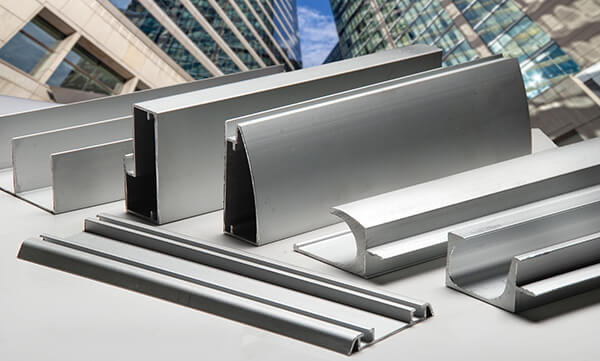
Aluminium profiles are extruded shapes or sections made from aluminum alloys, typically 6061 or 6063 alloys, through a process called extrusion. These profiles come in a variety of shapes, sizes, and configurations, and they are widely used in various industries due to their lightweight yet durable nature, corrosion resistance, and versatility. Aluminium profiles are known for their structural integrity and excellent design flexibility, making them an ideal choice for a wide range of applications.
Types:
Standard Profiles: These are the most common types of aluminium profiles and include shapes like T-slotted extrusions, angles, channels, and beams. They come in various sizes and are widely used for structural framing, support, and assembly applications.
Architectural Profiles – Facade Systems: These profiles are designed with aesthetics in mind and are often used in architectural and decorative applications. They include sleek, modern designs for facades, curtain walls, windows, and doors.
Industrial Profiles: Industrial profiles are engineered for specific industrial applications. They can include heat sinks, conveyor systems, machine frames, and assembly line components.
Transportation Profiles: These profiles are tailored for the transportation industry and are used in the manufacturing of vehicle frames, railings, and other automotive components.
Solar Panel Frames: Solar panel frames are custom aluminium profiles designed to hold and support solar panels in photovoltaic systems.
Heat Sink Profiles: These profiles are specially designed for efficient heat dissipation and are commonly used in electronics and LED lighting applications.
Advantages of Aluminium Extrussions:
Lightweight: Aluminium profiles are significantly lighter than steel or other metals, making them easier to handle and transport. This weight advantage reduces installation and shipping costs.
Corrosion Resistance: Aluminium is naturally corrosion-resistant, which ensures that aluminium profiles maintain their structural integrity even in harsh outdoor environments or when exposed to moisture.
High Strength-to-Weight Ratio: Despite being lightweight, aluminium profiles offer excellent strength, making them suitable for load-bearing applications.
Design Flexibility: The extrusion process allows for intricate and customizable shapes, making it possible to design profiles to meet specific needs. T-slotted profiles, for example, offer easy integration of fasteners and accessories.
Recyclability: Aluminium is highly recyclable, and aluminium profiles can be recycled with minimal energy consumption, contributing to sustainability efforts.
Thermal Conductivity: Aluminium’s high thermal conductivity makes it ideal for heat sink applications, where it can efficiently dissipate heat from electronic components.
Aesthetic Appeal: Architectural aluminium profiles are often chosen for their sleek and modern appearance, enhancing the visual appeal of buildings and structures.
Low Maintenance: Aluminium profiles require minimal maintenance due to their resistance to rust and corrosion.
Cost-Efficiency: Although aluminium may have a higher initial cost than some materials, its long-term benefits, including durability and low maintenance, often result in cost savings.
In conclusion, aluminium profiles are versatile and durable building blocks used across various industries. Their lightweight, corrosion-resistant, and customizable nature, coupled with their excellent strength-to-weight ratio, make them an essential material for a wide range of applications, from architectural design to industrial and transportation needs.
